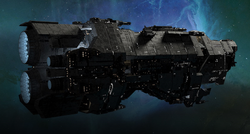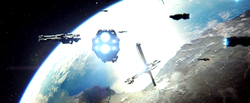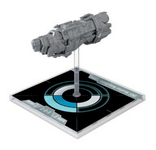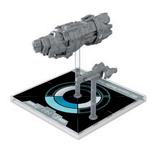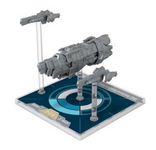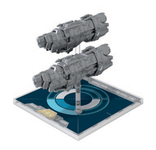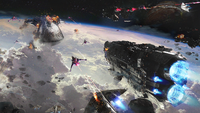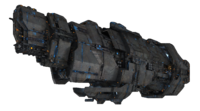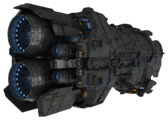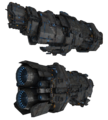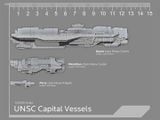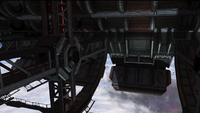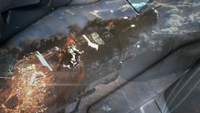Marathon-class heavy cruiser
From Halopedia, the Halo wiki
| Marathon-class | |||||||||||||||||||||||||||||
|---|---|---|---|---|---|---|---|---|---|---|---|---|---|---|---|---|---|---|---|---|---|---|---|---|---|---|---|---|---|
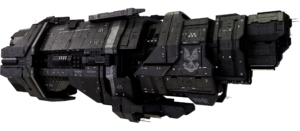
| |||||||||||||||||||||||||||||
| Class attributes | |||||||||||||||||||||||||||||
|
Identification: |
|||||||||||||||||||||||||||||
|
Operators: |
|||||||||||||||||||||||||||||
|
Manufacturer: |
|||||||||||||||||||||||||||||
|
In service: |
|||||||||||||||||||||||||||||
| |||||||||||||||||||||||||||||
The Marathon-class heavy cruiser (hull classification symbol: CA)[1] is a classification of cruiser in service with the UNSC Navy. Built as a replacement for the Halcyon-class light cruiser, the Marathon-class is nearly 1.2 kilometers long, heavily armored, and equipped with two Magnetic Accelerator Cannons and an impressive arsenal of missiles.[8][9]
These vessels were most often deployed in attack and defense roles, serving as the backbone of UNSC fleets, though they were also popular among high-ranking UNSC officers for use as command ships,[4] and were even deployed in rare instances in a light carrier configuration.[12] They were primarily used during the Human-Covenant War, though their numbers were heavily diminished and only very few remain in service in the conflict's aftermath alongside their successor vessel, the Autumn-class heavy cruiser.[13]
Overview
Design details
At 1,192 meters (3,910 ft) long,[4] Marathon-class heavy cruisers are more than twice the length of a typical frigate. Despite their size, Marathon-class cruisers are dwarfed by most Covenant cruiser classes.[8][9] As the successor to the Halcyon-class cruiser, these vessels have a similar profile, with a forward 'head' and large engine segment protected by armor cowlings, yet are not not identical and feature a streamlined inwards-slanted underside. The class also sports a thick 191-centimeter hull of Titanium-A armor, enabling it to withstand substantial amounts of fire even from plasma weaponry.[8][9] By 2552 the Marathon was considered to be one of the more powerful warships ever built by humanity,[14][15] outclassing its predecessor in virtually every respect.[8][9]
Like all warships of the UNSC Navy, Marathon-class heavy cruisers have a degree of operational flexibility that is achieved through the use of modular mission packages and reconfigurable hangar bays. Though a rare configuration, these cruisers could be modified and equipped to function as a light carrier, sacrificing missile pods and all of its cargo bays for additional hangar capacity.[12]
Crew and complement
Marathon-class heavy cruisers feature a standard complement of one thousand personnel, and are typically commanded by a captain or rear admiral, often being reserved for admirals to use as command ships due to their characteristic durability and firepower.[8][9] They are also known to have the capacity to carry Marine contingents as well as accompanying dropship transportation.[10]
Cruisers of the Marathon class are fitted with at least two hangar bays.[16][17] A large deployment bay containing numerous M8900 SOEIVs, referred to by Orbital Drop Shock Troopers as "Hell's waiting room", is located amidships.[11] Space aboard a Marathon is optimized to maximize the amount of heavy weapons and armor equipped on each ship, preventing the cruisers from carrying more space fighters; despite this, Marathon-class heavy cruisers can carry two dozen GA-TL1 Longswords.[8][9][Note 3]
Armaments
Marathon-class cruisers are considered among the most powerful warships in the UNSC Navy, and have an armament to suit. Their primary armament consists of a heavy Magnetic Accelerator Cannon;[5] with two 49F9A1 MACs.[3] This is reinforced with a secondary Missile Delivery System[5] consisting of 70 M58 Archer missile pods, 26 M40 Longbow missile pods,[3] and 5 fusion rockets.[8][9] The vessel is also equipped with a series of six M66 Sentry naval autocannons for general anti-ship duties,[3] and a tertiary Point Defense Network[5] of 12 M810 Helix point defense guns for close-in defence against space fighters, dropships, boarding craft, and missiles.[3]
Usage
Due to their durability and firepower, Marathon-class vessels often serve as command ships for a given naval unit.[5]
Due to its status as a core vessel of the UNSC Navy, the Marathon is a core component of several of the navy's tactical formations. These include:
- Barrage Battle Group: an informal designation for a single Marathon escorted by two Paris-class heavy frigates, suited as a multi-purpose organisation capable of being assigned to a number of tasks. Barrage groups were generally used to hunt down Covenant raiders and deal with insurrectionist uprisings.[18]
- Cerberus Battle Group: a specialist formation consisting of two Marathons paired together. These formations proved effective in the early stages of the Covenant War, though logistical challenges and a sheer lack of available vessels in the war's later stages made such battle groups hard to field. The long-range firepower available by the twin Marathons' combined MACs made these formations a priority target for Covenant hunting parties.[18]
- Cyclops Battle Group: a rare configuration which saw Marathons refit to serve as a light carrier; sacrificing missile reloads and all of its cargo bays for additional hangar bays. In addition to the modified Marathon, a Cyclops battle group also employs three groups of Paris frigates in Trident Formation.[12]
- Gorgon Battle Group: due to the short supply of heavy cruisers in the war's later years, it became a common practice to field even incompleted hulls to provide heavy MAC firepower to naval squadrons. Twin Marathons may be paired alongside a dedicated escort Paris frigate for each and two Trident Formations of Paris frigates, with the Marathons concentrating their firepower on heavily shielded Covenant vessels and giving the frigates a fighting chance against the weaker targets.[12]
Ships of the line
- UNSC Canberra (CA-70) – Fleet Admiral Joseph Harper's flagship; led the Fifth Fleet against the Covenant during the Battle for Earth on October 20, 2552.[1]
- UNSC Dresden – Equipped with a saddle box drive. Destroyed during the Battle of Biko in 2526.[7]
- UNSC Feeling Lucky – Part of the Fifth Fleet; destroyed during the Battle of Earth on October 20, 2552.[19]
- UNSC Hannibal – Destroyed during the Fall of Reach.[8][9][20]
- UNSC Leviathan – Vice Admiral Michael Stanforth's flagship. Severely damaged during the Battle of Sigma Octanus IV in July 2552 and destroyed during the Fall of Reach.[14][21]
- UNSC Marathon – The lead ship of the class.[22]
- UNSC Prophecy – Destroyed during the Harvest campaign in February 2531.[16][23]
- UNSC Say My Name (CA-942)[2] – Deployed ODSTs to board Solemn Penance as part of Operation: BUMRUSH during the Battle of Mombasa on October 20, 2552.[11][24]
- C-322[Note 1] - Participated in the Defense of Concord in December 2551.[25]
Service history
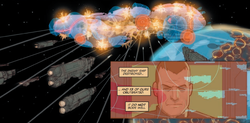
The Marathon-class heavy cruiser was commissioned and built as a replacement for the Halcyon-class light cruiser,[8][9] a smaller and more lightly armed cruiser which suffered from excessive production costs and a lack of tactical viability.[4] After a brief era of service,[5] most ships of the Halcyon-class were decommissioned, which led to the Marathon-class rising to prominence. By 2525, the Marathon-class was the most popular line of cruiser in service with the Navy.[4]
Human-Covenant War
- Main article: Human-Covenant War
Several Marathon-class heavy cruisers served in Battle Group X-Ray under Vice Admiral Preston Cole during the First Battle of Harvest. Throughout the early years of the Human-Covenant War, Marathons continued to serve in Cole's Third Fleet. Several Marathons from the fleet, including UNSC Prophecy, participated in the Harvest campaign.[16][23] At least one Marathon-class heavy cruiser, UNSC Dresden, participated in the Battle of Biko, where it was destroyed by the Covenant.[7]
As their numbers were diminished by the onslaught of the Covenant, many Marathons were reassigned to the defense of the Inner Colonies and Earth during the later years of the Human-Covenant War.[14] As of July 2552, only 20 cruisers remained within the UNSC fleet, possibly at least among the FLEETCOM Sector One.[Note 4] Vice Admiral Michael Stanforth's flagship Leviathan of the Battle Group Leviathan was present at the Battle of Sigma Octanus IV in July 2552 and was severely damaged during the battle.[26][27] Numerous Marathon-class heavy cruisers participated in the Fall of Reach, many of which were destroyed, including Leviathan.[8][9][17][28]
At least eight Marathon-class cruisers (including UNSC Canberra[1] and Say My Name,[24] assigned to the Fifth Fleet, a part of the UNSC Home Fleet) were present at the onset of the Battle for Earth. Led by Fleet Admiral Joseph Harper aboard Canberra and supported by sixty-seven Stalwart-class light frigates, these ships formed a defensive perimeter around the orbital defense platform cluster over the Mediterranean to prevent the Fleet of Sacred Consecration from reaching Earth's surface.[29] Admiral Carl Patterson's Battle Group Omicron, drawn from the Home Fleet, contained one Marathon-class heavy cruiser that participated in the Onyx Conflict, where she was destroyed with the rest of her battle group.[30]
Post-war
Most remaining Marathon-class heavy cruisers were decommissioned after the Autumn-class heavy cruiser was introduced, with only a handful staying in service.[13] The Autumn class became slated to serve as the core of the reconstituted UNSC Navy's fleet, a role the Marathon class had previously fulfilled.[5] A Marathon-class heavy cruiser served as the flagship of Admiral Graselyn Tuwa during an operation on Gao in 2553. The presence of the cruiser prevented Minister of Protection Arlo Casille from taking naval action against the UNSC, realizing that the cruiser could easily decimate his entire fleet of patrol corvettes.[31]
Non-canon and dubious canon appearances
Halo: Fall of Reach - Boot Camp
Several Marathon-class heavy cruisers participated in the Operation: TREBUCHET over Eridanus II against the Insurrectionists in 2513 during the Insurrection.[32][Note 2] One of these cruisers threatened the URF vessel Gateway, which experienced difficulties with its slipspace drive, until it was later ripped apart by Robert Watts using towing cables on his Charon-class light frigate, Iliad, and he sent the cruiser's debris into a collision course with another UNSC vessel, destroying both ships, alongside a Halcyon-class cruiser.[32]
Halo: Fleet Battles
Production notes
Though in-universe the class is likely named for the Battle of Marathon, in reality its name is a reference to Bungie's Marathon trilogy and its eponymous ship, the UESC Marathon.
The Marathon class is featured in Halo: Fleet Battles; although the Halcyon-class light cruiser was originally intended to appear instead, it was decided that the latter's appearance would not be canonically possible. The design for the Marathon class in the game was noted to have been difficult to sculpt, although the models created by Blur Studio for Halo 2: Anniversary aided in the process.[33] In the Halo Encyclopedia (2022 edition), the visual for the Marathon used (and featured on this page's infobox) is a model of the ship created by Jared Harris for the Halo fan mod Sins of the Prophets. The Sins of the Prophets team worked with 343 Industries to provide a number of ship illustrations for the encyclopedia.
Inconsistencies and disrepancies
In the original 2001 print of Halo: The Fall of Reach, UNSC Pillar of Autumn was compared to the profile of an "elongated frigate". In the novel's 2010 reprint, this reference was changed to compare Pillar of Autumn to a "Marathon-class carrier". This reference is erroneous, as the Marathon is a classification of cruiser.[34]
In the Timeline Events for Halo Wars, UNSC Prophecy is referred to as a destroyer, contradicting the depiction of a Marathon-class cruiser visualised in the Halo Wars: Genesis tie-in comic. At the time of Halo Wars' release, the only destroyer then-visualised in Halo media was the comic's own depiction of the Hillsborough-class heavy destroyer CMA Heracles.[16]
The Marathon's hull classification symbol is established in two separate sources; the Halo 2: Anniversary cutscene for Cairo Station and the Halo Legendary Crate data drops to be CA.[1][2] Despite this, the vessel C-322 - first mentioned in the Winter Update intel drops - was established in the chronicle story Halo: Winter Contention to be a Marathon-class.[25]
Gallery

|
Browse more images in this article's gallery page. |
Illustrations
Profile of a Marathon in Halo Mythos.
Halo Wars 3 pitch artwork depicting a Marathon facing down a CAS-class carrier.
Renders
The Marathon's scale compared to that of the Epoch-class heavy carrier and the Paris-class heavy frigate.
Screenshots
ODSTs gathered around a holo-table inside a Marathon-class cruiser.
A Marathon class is destroyed in the Halo: The Master Chief Collection announcement trailer.
A Marathon hull being pierced by a CAS-class assault carrier's energy projector.
List of appearances
|
Notes
- ^ a b At least one Marathon, C-322, does not use CA for its hull code.
- ^ a b The 2022 Halo Encyclopedia established the Marathon as having been first launched in 2520, which, however, contradicts Halo: Fall of Reach - Boot Camp Issue 1, as it depicted several Marathon-class cruisers being present during the Operation: TREBUCHET in 2513, rendering the comic panel depiction dubious.
- ^ a b As this is a very large number of fighters, and it has been stated that UNSC cruisers specifically trade fighter-carrying capacity for armaments and armor, it is likely that this number represents the carrying capacity of the Marathon-class when in its converted light carrier configuration instead of in its standard form.
- ^ See here by regarding the number of remaining cruisers as of July 2552
Sources
- ^ a b c d e Halo 2: Anniversary, campaign level Cairo Station: UNSC Canberra's hull code can be viewed on Hood's viewscreen.
- ^ a b c Halo Legendary Crate, Data Drop #2
- ^ a b c d e f g h i j k l Halo Encyclopedia (2022 edition), page 119
- ^ a b c d e f g h Halo: The Essential Visual Guide, page 42
- ^ a b c d e f g Halo Waypoint, UNSC Cruiser (Retrieved on Apr 13, 2016) [archive]
- ^ Halo 2, Marathon-class cruiser model data
- ^ a b c Halo: First Strike: Adjunct - Tug o' War
- ^ a b c d e f g h i j k l m n Halo Encyclopedia (2009 edition), page 251
- ^ a b c d e f g h i j k l m n Halo Encyclopedia (2011 edition), page 261
- ^ a b c Halo: The Fall of Reach, chapter 23
- ^ a b c d Halo 3: ODST, campaign level Prepare to Drop
- ^ a b c d Halo: Fleet Battles: Core Rulebook - page 124-125
- ^ a b Halo 4: The Essential Visual Guide, page 191
- ^ a b c Halo: The Fall of Reach, chapter 18
- ^ Halo: The Fall of Reach, chapter 25
- ^ a b c d e Halo Wars: Genesis
- ^ a b Halo: Fleet Battles: Marathon-class Heavy Cruiser in-game unit
- ^ a b Spartan Games, New Formations for Halo: Fleet Battles (Retrieved on Aug 25, 2017) [archive]
- ^ Halo Waypoint, Canon Fodder - Fifty Caliber (Retrieved on Mar 10, 2019) [archive]
- ^ Halo: First Strike, chapter 18
- ^ Halo Waypoint, Michael Stanforth (Retrieved on Apr 13, 2016) [archive]
- ^ Stephen Loftus on the Autumn class' talk page
- ^ a b Halo Wars, Timeline Events
- ^ a b Halo Waypoint, UNSC Say My Name (Retrieved on Apr 24, 2011) [archive]
- ^ a b Halo: Winter Contention
- ^ Halo: The Fall of Reach, chapter 21
- ^ Halo: The Fall of Reach, chapter 23
- ^ Halo: First Strike, chapter 22
- ^ Halo 2, campaign level Cairo Station
- ^ Halo: Ghosts of Onyx, chapter 32
- ^ Halo: Last Light, chapter 5
- ^ a b Halo: Fall of Reach - Boot Camp, issue 1
- ^ Halo Waypoint, Canon Fodder - In the Loop (Retrieved on Oct 15, 2018) [archive]
- ^ Halo: The Fall of Reach, chapter 29
| ||||||||||||||||||||||||||||||||||||||||||||||||||||||||
